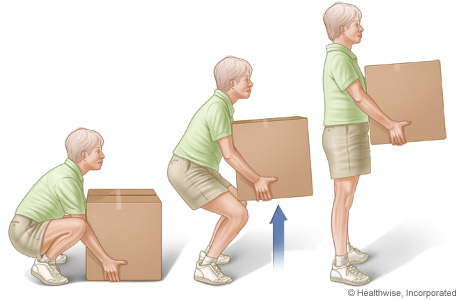Top of the pageActionset
Back Problems: Proper Lifting
Overview
No one is immune to having a back injury. Whether you have a strong back or have hurt your back before, it's well worth it to:
- Stop yourself before casually picking up a light or heavy load.
- Plan in your mind for the best way to lift what's in front of you. This could include getting help from one or more people.
- Lift and move slowly and carefully.
The time you take to use the right lifting mechanics is far less than the days, weeks, or months it can take to heal from a back injury.
How can you lift without hurting your back?

Follow these tips to avoid compressing the spinal discs or straining your lower back when you are lifting.
- Keep a wide base of support. Your feet should be shoulder-width apart, with one foot slightly ahead of the other (karate stance).
- Squat down, bending at the hips and knees only. If needed, put one knee to the floor and your other knee in front of you, bent at a right angle (half kneeling).
- Keep good posture. Look straight ahead, and keep your back straight, your chest out, and your shoulders back. This helps keep your upper back straight while having a slight arch in your lower back.
- Slowly lift by straightening your hips and knees (not your back). Keep your back straight, and don't twist as you lift.
- Hold the load as close to your body as possible, at the level of your belly button.
- Use your feet to change direction, taking small steps.
- Lead with your hips as you change direction. Keep your shoulders in line with your hips as you move.
- Set down your load carefully, squatting with the knees and hips only.
Keep in mind:
- Do not attempt to lift by bending forward. Bend your hips and knees to squat down to your load, keep it close to your body, and straighten your legs to lift.
- Never lift a heavy object above shoulder level.
- Avoid turning or twisting your body while lifting or holding a heavy object.
Credits
Current as of: July 24, 2025
Author: Ignite Healthwise, LLC Staff
Clinical Review Board
All Ignite Healthwise, LLC education is reviewed by a team that includes physicians, nurses, advanced practitioners, registered dieticians, and other healthcare professionals.
Current as of: July 24, 2025
Author: Ignite Healthwise, LLC Staff
Clinical Review Board
All Ignite Healthwise, LLC education is reviewed by a team that includes physicians, nurses, advanced practitioners, registered dieticians, and other healthcare professionals.


